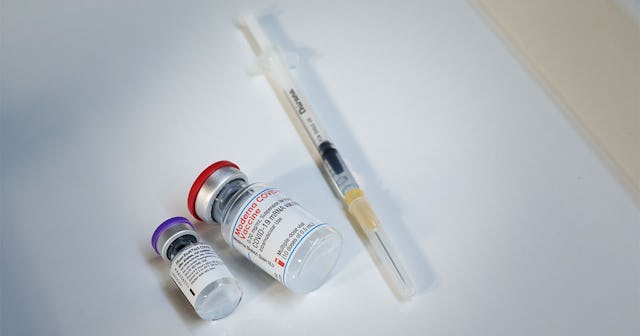Pfizer & Moderna Vaccines Effective At Preventing Infection In Real-World Conditions

The CDC says both Moderna and Pfizer COVID-19 vaccines are highly effective and reduce risk of infection by 90 percent by two weeks after the second shot
In a Centers for Disease Control and Prevention study of healthcare workers and first responders, both the Pfizer and Moderna COVID-19 vaccines were found to be highly effective at preventing infection in real-world conditions. The study, released Monday, points to a 90 percent reduction in infection by two weeks after the second dose.
After a year plus of pandemic awfulness, can we get a HELL yes for this bit of good news?
The findings suggest that the vaccines are effective at preventing both symptomatic and asymptomatic infection under real-world conditions, which is a big ol’ relief because the clinical trial data is one thing — the vaccine functioning in the real world is another. This is truly reassuring to see.
One dose was found to prevent 80 percent of infections by two weeks after the shot with the second dose upping that to 90 percent by the two-week post-shot mark. The reason this news is so big? There has been conversation in the scientific community over whether vaccinated folks can still transmit infection via asymptomatic infections and this study seems to suggest that’s not terribly likely to occur.
The other big worry floating around is what the vaccines can do when it comes to combatting COVID-19 variants. The time of the study was December 14, 2020 to March 13, 2021, months where some concerning variants were circulating. The vaccines were still effective even considering that scary factor.
The study’s subjects were 3,950 people who are in categories considered to be high at risk of exposure to the virus. This includes healthcare workers, first responders, and other people on the front lines. None of the study participants had been infected with COVID previously. In total, 62.8 percent of participants had received both shots during the study and 12.1 percent had received one shot.
Throughout the study period, subjects collected nasal swabs themselves weekly for PCR testing, which is the most accurate form of COVID-19 testing available. This allowed the study’s researchers to find out if participants had asymptomatic infections as well as symptomatic. Fifty-eight percent of the infections were detected before study participants had any symptoms with only 10.2 percent of those infected never having any symptoms.
Now here’s the part worth standing and cheering for — of the participants who were fully vaccinated, there were only .04 infections per 1,000 person-days. That translates to just .04 infections in a day among 1,000 people. Among those with just one shot? The numbers were still pretty reassuring with just 0.19 infections per 1,000 person-days.
Bottom line for those who just want to cut to the chase? “This study shows that our national vaccination efforts are working,” says CDC Director Dr. Rochelle P. Walensky.
This article was originally published on